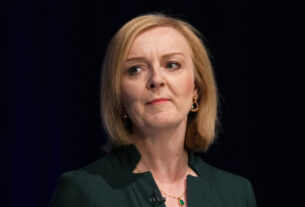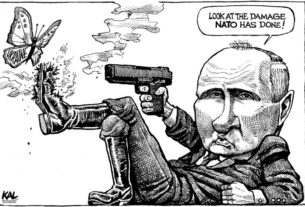PARIS/BERLIN — Thirty years after the horrors of the Balkan wars laid bare Western Europe’s incapacity to deal with conflict on European soil, Russia’s invasion of Ukraine is demonstrating how little has changed.
As Yugoslavia started to break apart in 1991, it fell to the Luxembourgish Foreign Minister Jacques Poos to make the ill-fatedly optimistic remark: “This is the hour of Europe, not that of the Americans.”
Since then, there have been years of agonized soul-searching, particularly in France and Germany, about why Europe failed to stand up as a military force. Stung to a new level of panic by former U.S. President Donald Trump’s “America First” mantra, both French President Emmanuel Macron and former German Chancellor Angela Merkel issued dire warnings that the EU had to finally face the grim fact that it could no longer rely on the U.S.
Macron continually talks a huge game on Europe establishing its own security agenda but his pledges — along with those of many other senior European politicians — to pursue a policy of European “strategic autonomy” in which the EU will massively reduce its military dependency on the U.S. have so far been almost exclusively rhetorical.
Faced with Russian President Vladimir Putin’s genocidal onslaught against the biggest country entirely within Europe, France and Germany spent seven months relying militarily on Washington, and to a lesser extent on Britain, to guarantee democracy and freedom in a close EU ally.
According to the Kiel Institute for World Economy, the U.S. has pledged €25 billion in military support to Ukraine and the U.K. pledged €4 billion. By contrast, Germany has promised €1.2 billion, behind Poland on € 1.8 billion, while France’s military support for Kyiv barely registers, at €233 million, lagging Estonia in the league table. Britain has trained 5,000 Ukrainian troops, while France has trained 100.
These discrepancies are a question of political will, not cash. The EU has an annual gross domestic product of €14 trillion, and a combined defense budget of €230 billion. France, however, has stressed that it does not want to be a “co-belligerent” in the war or “humiliate” Russia, while German Chancellor Olaf Scholz stresses the dangers of being sucked into the war.
All eyes are now on whether a potential change of heart is imminent, and whether Europe’s economic kingpin Germany and France, the EU’s only nuclear-armed power, will agree to send Leopard 2 and Leclerc tanks. Ukraine itself is putting out a plea for more arms now that Putin has committed hundreds of thousands more troops to the fight.
Our fate in our own hands
The differences in spending between the U.S. and the Western Europeans raise excruciating questions for the EU leaders about what would have happened to Kyiv if the U.S. president had been less open to large-scale intervention than Joe Biden.
In a keynote speech this month, German Defense Minister Christine Lambrecht acknowledged that the situation was untenable.
“Germany and the Europeans depend on a peace order that they cannot guarantee on their own,” Lambrecht said, adding that this was particularly problematic as America is increasingly turning “its main attention” to the Pacific.
In a keynote speech this month, German Defense Minister Christine Lambrecht acknowledged that the situation was untenable | Jens Schlueter/AFP via Getty Images
Washington “may no longer be able to guarantee the defense of Europe to the same extent as it did in the past,” the minister said. “The conclusion is clear: We Europeans, and thus most prominently we Germans, must therefore do more to be able to credibly show so much military strength ourselves that other powers will not even think of attacking us.”
Yet whether those words will be followed by action remains unclear. Her critics were quick to point out that former Chancellor Merkel already reached a similar conclusion in 2017 — telling a party rally in a Munich beer tent that “we Europeans truly have to take our fate into our own hands” — without much happening afterward.
It’s a phenomenon that has plagued European defense for a long time: “Already back in the 1990s the tenor was: It cannot be that we’re always dependent on the Americans,” said Claudia Major from the German Institute for International and Security Affairs.
She referred to the 1998 Franco-British Saint Malo declaration, a response to the failures of the Balkan wars, which stressed that Europe “must have the capacity for autonomous action, backed up by credible military forces.”
Instead, however, “little happened since” because the main European powers “didn’t feel militarily threatened and simply relied on the U.S.,” Major said.
Can’t work together
Although it has been long been received wisdom that the EU won’t succeed in credibly boosting its defense capabilities as long as it keeps 27 armies that often try to individually perform the same tasks and develop their own equipment, efforts to pool resources keep hitting fatal snags.
“We have to harmonize our actions, just as [Germany] emerges as a second military power. Our efforts are fragmented, there is so much wastage because we have so many different models of tanks, vessels and fighter jets,” said former French Europe Minister and MEP Nathalie Loiseau.
Few things so neatly symbolize the woes of this poor cooperation and mistrust than the plight of the Franco-German-Spanish fighter jet project FCAS. It literally won’t take off.
The FCAS, which stands for Future Combat Air System, has been mired in delays and difficulties for years and has suffered fresh setbacks even as European governments vow a renewed commitment to defense in the wake of the Ukraine war. The first models of the fighter jet are not expected before 2040 thanks to disagreements between the French and the Germans over the leadership of the joint project.
French officials and defense experts are fuming about the recent German decision to replace the so-called “nuclear share” part of its airforce, which is supposed to be able to drop U.S. nuclear bombs in case of a war with Russia, with American F-35 fighter jets.
“There isn’t a very clear line in Germany. Some things are reassuring, others are worrying. France can’t really lean on Germany in matters of defense,” said Pierre Haroche, a European defense expert at the IRSEM think tank backed by France’s defense ministry.
German officials say that the F-35 decision does not change Berlin’s commitment to the FCAS | Eric Baradat/AFP via Getty Images
“Germany’s priority is not to build a European defense, it’s to rebuild its army that was falling apart. It wants to regain its status as a good NATO pupil,” he added.
German officials say that the F-35 decision does not change Berlin’s commitment to the FCAS. Instead, they argue it had been made merely because new planes had to be bought immediately, while FCAS was still far from being operational. Furthermore, the officials in Berlin argue that Washington would not have agreed to have American nuclear bombs carried by a plane whose construction plans were not previously made available to U.S. intelligence.
For its part, Germany has accused France’s defense industry of not playing ball when it comes to military cooperation.
“In everything we discuss, it must be clear at the end that we will be treated as equals. And that there cannot be French industrial companies that want to restrict access to certain knowledge. We should pay for it but don’t get full access to all data? That can’t be,” Lambrecht told POLITICO.
Yet Lambrecht also acknowledged that, in order to boost joint European defense projects, Germany must abandon its policy of partly blocking arms exports that other allies consider as unproblematic.
“If I’m doing such a project together with my allies, who share the same values as I do, and if I’m the only country there that has a different position on an export, then you have to ask yourself whether that can actually be the obstacle,” she said.
No solution from Brussels
Brussels is trying to bang heads together to get European countries to join up their defense projects, but progress is glacial.
The European Commission in May proposed a new plan to coordinate military spending among EU member countries. Whether countries buy American or buy European has become a key point of the discussion. Josep Borrell, the EU’s top diplomat, stressed that Europe buys some 60 percent of its kit from outside the bloc and urged a shift to more domestic sources.
The proposal is now being studied by defense experts in the Council and there’s hope that it can land on the desk of defense ministers in November, before going to the European Parliament. However, diplomats working on the dossier are not convinced that such a timeline is feasible because the discussion is still in the early stages. The sums involved are also small. The Commission is proposing €500 million over two years to support joint procurement of weapons, which diplomats say is too little to boost European capacities.
“For sure we, don’t have a game changer yet,” one of the diplomats said. Another more ambitious proposal is expected from the Commission but it’s unclear when exactly it will land.
Key bones of contention include the rules for defense companies that receive subsidiaries from outside the bloc or have global ownership structures and the use of high-tech components coming from countries such as the U.S or the U.K. Diplomats say that France has a stricter view on these issues compared, for example, with Italy or Sweden.
However, the fundamental issue is that to buy European, member countries have first to be convinced that they are buying state-of-the-art products built with the best available technologies. “We cannot buy European for the sake of buying from European industries, that seems clear to me,” said a senior diplomat.
Credibility gap
At times, it has seemed like the severity of the Ukraine war could finally force a meeting of minds between France and Germany.
Last month, German Chancellor Olaf Scholz outlined his vision of “a stronger, more sovereign, geopolitical European Union” | Tobias Schwarz/AFP via Getty Images
Last month, Scholz outlined his vision of “a stronger, more sovereign, geopolitical European Union.” In Paris, Scholz’s statement was read as a belated answer to Macron’s 2017 call for “strategic autonomy.” Macron had hoped to re-energize Europe’s defense policy and spoke of the need to build “a common intervention force, a common defense budget and common doctrine to act.”
But beyond the diplomatic niceties, neither Scholz nor Macron have been able to take the lead in the war. France and Germany have fallen in the wake of Poland and Nordic and Baltic nations in trying to steer the European agenda.
Several French officials have said that the publicly available numbers on military donations were unreflective as France has not disclosed all its donations. If so, it’s a decision that has backfired according to Philippe Maze-Sencier, a public affairs expert at the Institut Montaigne and global chair of public affairs at Hill+Knowlton Strategies.
“We decided not to play the communications game, but it means France is in seventh position in international rankings, on a par with Norway. But we don’t play in the same league as Norway. No wonder we are not legitimate when it comes to spearheading the Europe of defense,” Maze-Sencier said.
Macron’s past attempts at casting himself as a mediator in the conflict, promoting France as “a balancing power” on Ukraine, have also sparked suspicions over his long-term objectives. His decision to keep lines of communication open with the Kremlin and past calls “not to humiliate Russia” were derided in many parts of the EU, according to Maze-Sencier.
“[France] has lost credibility because of our position on Ukraine. Put crudely, our friends in Nordic countries, the Baltic states and in Eastern Europe feel let down and even compare it to [the lack of solidarity] in WWII,” said Maze-Sencier.
“They say give us U.S. protection any day,” he added.




